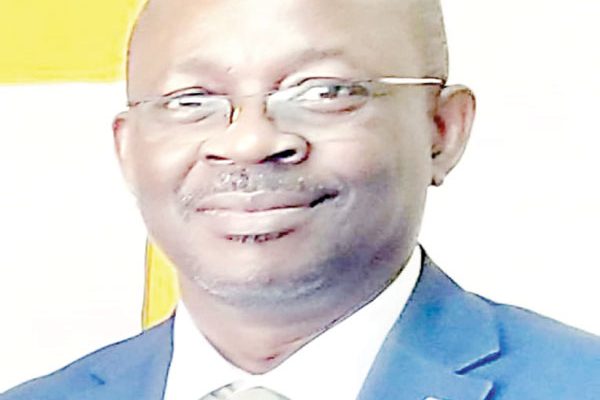

In this interview by SADE OGUNTOLA, a consultant urologist at the University College Hospital (UCH), Ibadan, Dr Augustus Takure, speaks on prostate cancer, why men should not be afraid of the disease and what they should do for a healthy prostate.
What is prostate cancer, and how common is it?
Prostate cancer is the accumulation of excess cells within the prostate, and it is the most common cancer in males worldwide, followed by lung and large bowels. In North America, prostate cancer affects about 272 per 10,000 men, whereas in Nigeria, studies show that prostate cancer affects about 152 to 182 per 100,000 men. That is the frequency of the disease in the population.

But if you are looking at how common the death is, that is, mortality, we will say that the chances of dying from prostate cancer differ with race. Among the whites, it is approximately three percent, whereas among the blacks, particularly blacks in America, where they have done extensive studies, it is about five percent. So, the chances of dying from this cancer are higher for blacks. But the incidence, which is the chance of having cancer in a lifetime, is about 18 percent among whites and 21 percent among blacks. So, it is very common among blacks rather than whites.
Is prostate cancer one and the same for every sufferer?

No, there are different types of prostate cancer, but the commonest is adeno-carcinoma. There is also endocrine cancer, but the commonest one is adeno-carcinoma. When a specimen is sent, the most common is adenocarcinoma, but if you are talking about how it manifests, that is entirely a different question.

Of course, you have different ways that prostate cancer can manifest. We can say that prostate cancer is sporadic when it occurs once in a while. That is actually the most common among men. We can say that prostate cancer is familiar when it runs in families. We can say that prostate cancer is hereditary when it is with the nuclear family: from father to son and son to grandson. That is the way it can manifest—sporadic, familiar and hereditary.
What are the common signs and symptoms for Nigerian men who have prostate cancer?
Well, let’s look at it this way: prostate cancer in the western world is an incidental cancer; it is found when people are doing other things or for other reasons. But among Nigerian men, it is usually present at an advanced stage. In other words, they have symptoms by the time they are coming to the hospital.
What are these symptoms that they usually present with? They present with symptoms that affect the way they pass urine, and these symptoms can be divided into storage and voiding issues: the inability of the bladder to keep urine and the inability of the bladder to expel urine. They are not specifically related to prostate cancer, but these complaints are related to the presence of prostate in men, so they have infrequency of passing urine, urgency of passing urine, inability to hold urine when the desire arises, and they pass urine too often in the night. They wake up in the night to pass urine. There are times when they cannot even control urination. Urine leaks before they get to the toilet or restroom.
Then they can also have problems passing urine itself. There will be a delay when they get to the place where they want to pass urine. There is a frank delay for a few minutes before the urine starts flowing, and when it is flowing, it may be weak; it may break and then continue. They may have a feeling that they have not completely emptied their bladder, or they can have an overflow, where the bladder is full but the urine is leaking. These are some of the symptoms. They are not symptoms specific to prostate cancer, but they are things that can make you suspect that an individual has a problem with his prostate.
If we are now talking about prostate cancer, Nigerian men often present with an advanced condition. In other words, the cancer has spread beyond the prostate. If the cancer spreads beyond the prostate, the way they can present is that they have this unusual tiredness or weakness of the body. Without passing blood with urine, they just become very tired. We call that severe anemia. Some of them may start passing urine with blood; some will come with weakness of the legs; and some may not even be able to walk at all. More often than not, the majority of them have back pain. This is how the majority of Nigerian men with prostate cancer present at that stage, which is called the advanced stage of the disease.
Are there known or established causes of prostate cancer in Nigerian men?
Men have the same characteristics; it is just the type that differs. So, if you talk of causes, we will talk about the predisposing factors or the things that may make a man susceptible to a disease. The first thing is the presence of the testes in men. The testes produce the male hormone, testosterone, and the byproduct of testosterone stimulates the prostate to change in different directions, so it can become painful and undergo cancer changes. So, the testis is the first culprit.
We mentioned earlier that prostate cancer can be hereditary or familiar. It can run in the family. If a member of the family has prostate cancer, there are chances that the descendants of that man will have it at an early age. There are other things that have been observed when such a man with hereditary or familiar prostate cancer running in his family travels to America. For instance, they tend to have prostate cancer at an even earlier age. So, it is extrapolated that probably the diet that they are taking—the fat diet—may predispose them to cancer of the prostate. They talk about the intake of unsaturated fatty diets.
Now we can also look at weight. Men who are obese have a higher chance, particularly when their body mass index (BMI) is more than per squareg per meter. Obesity can predispose a man to prostate cancer, and of course, deficiency of some nutrients in the diet like vitamin D can also predispose one to prostate cancer. Vitamin D is the vitamin that has the most protective effect on the body. When there is a deficiency of vitamin D, the individual is more likely to have any cancer, particularly prostate cancer. So, deficiencies of vitamins can cause predisposition to prostate.
Men in the tropics daily take in vitamin D, but it is contrary to the finding that prostate cancer is more likely in black men than white men, despite their intake of daily doses of vitamin D. It is contradictory. How do you explain this?
It is not the only risk factor for prostate cancer; there are multiple factors. We cannot therefore say that because they are exposed to vitamin D, that alone is protective against prostate cancer.
Can a man recover from prostate cancer? What are the chances of recovery?
Scientifically speaking, prostate cancer is curable if it is identified very early, when there are no symptoms. If you find the cancer in small percentage in the prostate, you can cure the individual. You can offer treatments that can cure the cancer. Such treatments include radical surgery or radiotherapy or cryotherapy. So, you can cure it at an early stage, when there are no symptoms. But once there are symptoms, it means that the disease has progressed and probably spread. You may not be able to cure it; you may only control it.
What is the five-year survival rate for prostate cancer in Nigeria?
The five-year survival depends on whether they are the ones that are curable. We do not have a high number of curable prostate cancers in Nigeria because we usually have advanced cancers. In advanced cancers, we don’t have a good prognosis. For those curable prostate cancers, five-year survival is 80–90 percent, but for the advanced cancer, the survival rate will be around 15 percent. I don’t have the exact figures, but it is not as high as the curable ones. And what really happens is that once patients are treated, they don’t really come back; contact with them is lost. So, we don’t have accurate data on that.
Is there any way a man can maintain a healthy prostate so that he does not end up with prostate cancer?
Prostate cancer is age-related. The older you are, the higher the chances that you will have prostate cancer. Men who had died of other causes, at postmortem, when their bodies were examined and tissues were taken, cancer was found within their prostate, but the cause of the death was not prostate cancer. So, for instance, if you take 10 men around the age of 80, about eight of them are likely to have prostate cancer, but not that the prostate cancer will cause trouble in them. It will only be symptomatic in about 30 to 40 percent of them. You cannot stop aging, so the older you are, the greater the chances of prostate cancer. So, the emphasis is not stopping; the emphasis is identifying it at its early stage so that you can control it or totally eradicate it. That is the emphasis. There is no cause for alarm, if you grow older, you are likely to have cancer, but it is restricted to the prostate.
What we want to prevent is the effect of the cancer on the body. Rather than come at a stage when it has developed and is causing problems, we can screen children of men who have had prostate cancer since the age of 40. We screen for prostate-specific antigens (PSA). We can check the level of PSA on a yearly basis from the age of 40, depending on the family history of prostate cancer. But if there is no family history of prostate cancer, at the age of 65, we can start checking the PSA so that we can pick it up at an early stage and stop the disease from manifesting.
Second, there are some diets that are protective. Tomatoes have a substance called lycopene, and lycopene is believed to be protective against prostate cancer. It has an antioxidant effect that suppresses cancer cells. So, if you take lycopene-related diets or anything that contains lycopene, you can slow down the early occurrence of prostate cancer, and you can now add early exposure to vitamin D from the sun between 11 p.m. and noon to increase the vitamin D level in circulation. Of course, our natural vegetables are also protective, but we are beginning to adopt westernised diets and canned foods. The moment we moved to canned foods, we increased the cancer level in our body. The natural diets are protective. If we restrict ourselves to natural diets, the incidence will actually reduce. Those are some of the measures that we can take to reduce the effects of prostate cancer.
A study in a journal linked prostate cancer to the human papilloma virus. According to the study, men with HPV infection have a higher risk of prostate cancer, and HPV was found in prostate cancer in about 25.8 percent of the men. What is your opinion on the study, particularly now that Nigeria is only vaccinating girls against HPV – excluding boys?
HPV is more relevant when you talk about cervical cancer, and that is why there is a vaccination against it. Since this is just a research finding, we need to replicate the study in other environments and see whether the incidence of HPV in men with prostate cancer is higher. It is a very good observation, but it is not a key factor in the causes of prostate cancer; it is just a research finding. We will not dismiss it; it is relevant, but HPV can cause cancer in any part of the body.
It is commonly said that having more s3x is protective against benign prostate enlargement and prostate cancer. How true is that?
These are observations from some little studies. Yes, it is possible. It was found that those who are s3xually active have lower chances of developing prostate cancer, and then they extrapolated that regular sex or fewer sex may be protective. It is just extrapolation; it is not a standard, generally held belief, or scientific belief; it does not work that way. But if you are sexually active, you have a delay in the manifestation of prostate cancer, but engaging in sexual activity does not protect you. Engaging in s3xual activity, for instance, exposes you to HPV and other sexually transmitted infections. If one is s3xually active and you now want to be engaging in s3xual activity with every Tom, Dick and Harry, he is going to contract HPV, which will increase the chances of getting infected. So, the s3xual activity must be restricted to the couple; it is not a general freedom to start having illicit sex because you want to prevent prostate cancer.
It is an observation from a study that prostate cancer is less common among men who have regular sex, and therefore it is possible that if you have s3x regularly, it may protect you. That is the conclusion from the study, but the conclusion did not say that you should now start having sex.
It was not recommended that you should be having s3x to get protected from prostate cancer. The general recommendation is to do tests that can help you detect cancer early, when it is curable. If you don’t do screening regularly, the cancer may become advanced at the time you are presenting and then become incurable, and then the burden of the disease will start manifesting. So, it is the burden of the disease that we are trying to run away from. The burden of the disease is the effect of the disease on the man, the family and the community because it consumes the wealth of the family and community. They end up spending a lot of money carrying out tests in order to confirm the disease. So, the burden is what we are trying to reduce by recommending regular screening. So, you can go for a PSA test through your doctor once a year to check the prostate by examining it with a finger, or they can do an ultrasound to identify some changes that may suggest cancer, and then they take a biopsy to be sure it is not cancer. That is what we recommend. That is regular screening, preferably a yearly screening, so that you can catch the cancer at an early stage.
What I am trying to say is that men, if they can pick up the cancer very early, can cure it. For those who do not have the opportunity to detect it and manifest these symptoms, they should go to the nearest hospital where they can be examined and evaluated. So, it is a disease that can be controlled. Fear of death should not be the priority. It is a disease that can be managed successively.
Men should not be afraid of prostate cancer. They should go for regular screening. If they pick up the cancer at an early stage, they can be offered the curative options that are available now.
READ ALSO FROM NIGERIAN TRIBUNE









